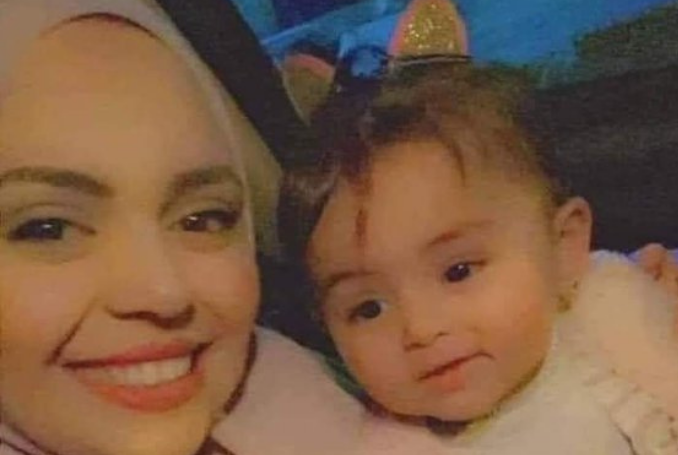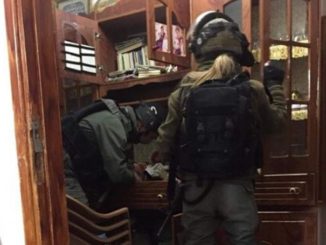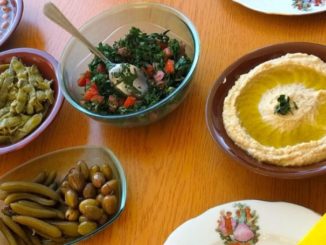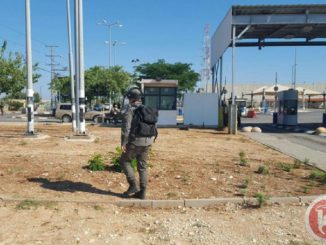
By Benay Blend
In late August 2021, Palestinian prisoner Anhar Al-Deek, who is nine months pregnant, wrote a moving letter to her family.
“What should I do if I give birth far from you? I am tied up, how can I give birth via cesarean section when I am alone in prison?” she asked, then added, “I am exhausted, and I had severe pains in the pelvis and severe pain in my legs due to sleeping on the prison beds. I do not know how I want to sleep on it after my delivery operation.”
According to Shatha Hammad, officers accused her of attempting to carry out a stabbing attack, but have not ruled on her family’s appeal to have her released for the birth of the child in what appears to be a complicated medical situation. Anhar’s mother Aisha told Middle East Eye reporters that her daughter had gone out for a walk where she was attacked by Israeli soldiers who accused her of trying to stab them. They continued to beat her, Aisha said, even though she told them repeatedly that she was pregnant.
While her mother has contacted human rights officials to aid in her daughter’s release, so far the Zionist state has not responded, despite the fact that Anhar has been diagnosed with depression, made worse over the fear that her baby will be delivered in a filthy prison cell.
As Al Mayadeen observes, Anhar is not the first pregnant Palestinian detainee, nor will she be the last. In Damon prison alone there are 40 other women prisoners joining her, including 11 mothers who are 4 months pregnant.
Al-Deek’s case illustrates the ways that motherhood has been politicized by right-wing regimes in order to silence women by the use of state-sponsored torture. Indeed, during Argentina’s Dirty Wars (1976-1983), the junta was a patriarchal system that used state-sponsored torture to intimidate its victims into submission.
As opposed to “good” mothers, politically active women, in particular, posed a threat to social harmony. As Diana Taylor notes, this gendering of the enemy resulted in an assault on captive women’s reproductive organs, family bonds, and finally on their lives (Disappearing Acts: Spectacles of Gender and Nationalism in Argentina’s “Dirty War,” 1997).
In Occupied Palestine, the Zionist state sponsors similar acts, with variations. For example, political prisoner and Palestinian leader Khalida Jarrar was denied the right to attend her daughter Suha’s funeral. Despite numerous appeals from Palestinian rights groups, some of the same groups that are advocating for Al-Deek’s release, the Israel Prison Service (IPS) refused to grant her wish.
Jarrar’s letter to her daughter from Damon Prison, read at Suha’s funeral, illustrates not only her pain but also the ways that women turn their grief around to build a discourse of solidarity while in prison.
“I am in so much pain, my child,” she writes, “only because I miss you,” but “from the depths of my agony, I reached out,” she continues, “and embraced the sky of our homeland through the window.”
In an earlier letter to the Palestine Writes Festival, Jarrar writes:
“Although physically we are held captive behind fences and bars, our souls remain free and are soaring in the skies of Palestine and the world. Regardless of the severity of the Israeli occupation’s practices and imposed punitive measures, our free voice will continue to speak out on behalf of our people who have suffered horrendous catastrophes, displacement, occupation and arrests. It will also continue to let the world know of the strong Palestinian Will that will relentlessly reject and challenge colonialism in all its forms.”
In those words, she speaks of Palestinian sumoud (resilience), prevalent among the women prisoners, as well as a community of resistance that binds Palestinian prisoners together both inside the prison and with all those seeking justice in the larger world.
“The challenge for prisoners,” she continues, “is to transform [their] detention into a state of a ‘cultural revolution” through reading, education and literary discussions.” In this way Jarrar uses political education as a tool to create a discourse of solidarity that turns each prisoner’s individual struggle into communal resistance against the occupation.
Mai Masri’s film 3000 Nights illustrates, too, how the birth of the protagonist’s son in prison opens her up to a sense of community among the other women who help to raise her baby. Through this experience, Layal, who is unjustly imprisoned, learns how to play the system but also develops a sense of justice that will guide her when she is released.
Unlike these women, who benefit from a community of women, Anhar Al-Deek is by her own description “alone and handcuffed,” confined to her solidarity cell to await the birth of her child.
Many years earlier, during the early days of the 1987 Intifada, another woman immortalized in the documentary Naila and the Uprising, suffered from torture during interrogation while she was in prison, and it resulted in the miscarriage of her child. In this instance Naila’s husband reached out to an Israeli journalist whose publicity of the case forced the Israelis to admit that Naila was being held by the Shin Beit, Israel’s secret service. However, by that time she had lost the child.
What ties all of these stories together, and what unites them across time and space with atrocities against women in other countries, are the efforts by right-wing regimes to break specific group identities, in this case by assaulting women through their motherhood. When women are not separated from each other, as in Anhar’s case, they often move beyond their individual situations by organizing collective resistance.
In support of Anhar, activists are tweeting under the hashtag #SaveAnharAlDeek, demanding human rights organizations intervene before she is forced to give birth in prison. In this way, collective action hopefully will prevail, even though Anhar has been forced into solitary confinement, which is in itself a form of torture for a woman in her state.
In her Foreword to Ramzy Baroud’s These Chains Will Be Broken: Palestinian Stories of Struggle and Defiance in Israeli Prisons (2020), Khalida Jarrar writes that “prison is comrades—sisters and brothers who, with time, grow closer to you than your own family. It is common agony, pain, sadness and, despite everything, also joy at times” (p. xvii).
Handcuffed and alone in a solitary cell, Anhar does not have the benefit of this community. She is dependent, then, on those outside the prison to collectively call attention to her case.
– Benay Blend earned her doctorate in American Studies from the University of New Mexico. Her scholarly works include Douglas Vakoch and Sam Mickey, Eds. (2017), “’Neither Homeland Nor Exile are Words’: ‘Situated Knowledge’ in the Works of Palestinian and Native American Writers”. She contributed this article to The Palestine Chronicle.

– Benay Blend earned her doctorate in American Studies from the University of New Mexico. Her scholarly works include Douglas Vakoch and Sam Mickey, Eds. (2017), “’Neither Homeland Nor Exile are Words’: ‘Situated Knowledge’ in the Works of Palestinian and Native American Writers”. She contributed this article to The Palestine Chronicle.







